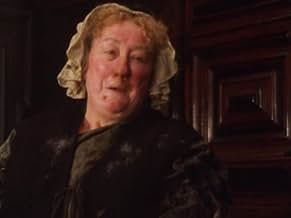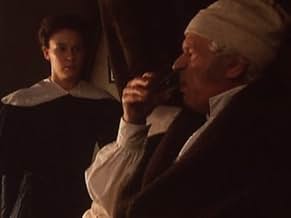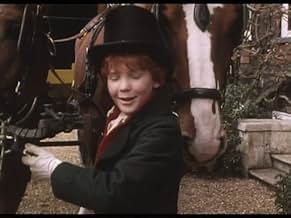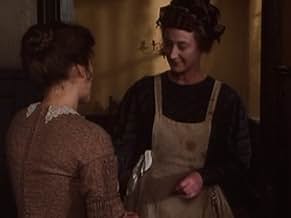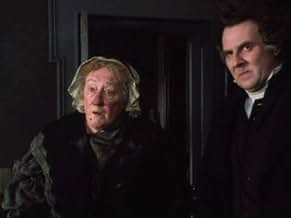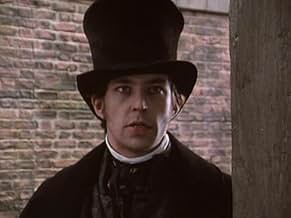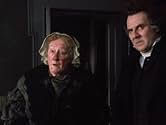Martin Chuzzlewit
- Mini serie TV
- 1994
- 6h 25min
VALUTAZIONE IMDb
8,1/10
1039
LA TUA VALUTAZIONE
Il vecchio Martin Chuzzlewit è prossimo alla morte. Chi erediterà le sue ricchezze? Con questo premio in palio, la famiglia Chuzzlewit mette in campo tutta la sua astuzia, avidità ed egoismo... Leggi tuttoIl vecchio Martin Chuzzlewit è prossimo alla morte. Chi erediterà le sue ricchezze? Con questo premio in palio, la famiglia Chuzzlewit mette in campo tutta la sua astuzia, avidità ed egoismo. Adattato dal romanzo di Charles Dickens.Il vecchio Martin Chuzzlewit è prossimo alla morte. Chi erediterà le sue ricchezze? Con questo premio in palio, la famiglia Chuzzlewit mette in campo tutta la sua astuzia, avidità ed egoismo. Adattato dal romanzo di Charles Dickens.
- Candidato a 1 Primetime Emmy
- 2 vittorie e 6 candidature totali
Sfoglia gli episodi
Trama
Lo sapevi?
- QuizThe madder red and gold print gown Lynda Bellingham (Mrs. Lupin) wears at the inn is the same gown worn by Justine Waddell (Molly Gibson) while walking with Roger at The Towers in Wives and Daughters (1999), and by Emma Pierson (Fanny Dorrit) while visiting the Gowans in Venice in Little Dorrit (2008).
- ConnessioniFeatured in The 47th Annual Primetime Emmy Awards (1995)
- Colonne sonoreSymphony No. 9 in E minor Op. 95 'From the New World' II. Largo
Written by Antonín Dvorák
Heard in score during American sequences
Recensione in evidenza
In 1842 Charles Dickens was at a critical point in his career. His attempt at a series of stories told by different characters to each other, "Master Humphrey's Clock", was not a success, although it produced a popular novel ("The Old Curiosity Shop"), and a first attempt at a historical novel ("Barnaby Rudge"). He decided to take a trip to the United States.
The results was bad. He found Americans thievish for not giving him copy-write protection. He found them hypocrites for screaming for freedom, but winking at slavery. He found their cities far less acceptable than the English ones. There was less gentility. There was more rough edged belligerence (especially to the old enemy: England). He hated it. He returned to England and wrote "American Notes". The book roundly attacked the Americans. He was not forgiven for years.
He compounded the act in his next novel, "Martin Chuzzlewit", from 1843 - 1844. In this period, ironically, he was to start writing his small Christmas novels, the first of which ("A Christmas Carol") would become immortal - far more than "Chuzzlewit" actually did. But "Chuzzlewit" is regarded by critics as the best of Dickens comic novels. Yet if one person out of five reads the novel today I'd be surprised.
The novel deals with young Martin Chuzzlewit (Ben Walden), who is apprenticed to his cousin the architect Seth Pecksniff (Tom Wilkinson). Pecksniff is the British equivalent of Moliere's Tartuffe - the arch-hypocrite. As "tartuffel" is the term based on Moliere's character, so is the word "peck-sniff" due to Dickens (in "You Can't Cheat An Honest Man", an angry Mr. Belgoody - Thurston Hall - tells off Larson E. Whipsnade - W.C.Fields - calling him both a tartuffel and a peck-sniff). Pecksniff, pretending to be religious and good, back-stabs his way through the novel, stealing ideas from other architects (including Martin), and pushing his plans to gain control over Old Martin (the grandfather of the hero), a wealthy, retired merchant. Old Martin is played by Paul Schofield. Schofield also plays Old Martin's younger brother Anthony, who has a son Jonas (Keith Allen). Jonas wants to inherit too.
Dickens had demonstrated a grasp at the criminal mind in his handling of Bill Sykes and Fagin in "Oliver Twist". But the burglar and the thief trainer were relatively simple types (although Sykes fury at Nancy and his subsequent self-destruction was unique for British literature at that time). Jonas was a higher class criminal - a murderer who did it for money, not anger. He first destroys Anthony, and then goes after his cousin Montague Tigg, a cousin who is a swindler and a blackmailer. The killing of Tigg (whom Jonas ambushes while he is riding in a gig) is based (somewhat) on the murder of William Weare by John Thurtell in 1823. But there is more than that in Jonas. He is rejected by Pecksniff's daughter Charity (nicknamed Cherry / played by Emma Chambers), who subsequently gives in to his courting - only to discover he pursued her to punish her for initially rejecting him. He is blackmailed by Tigg into investing in a financial swindle, and purposely pulls his father-in-law Pecksniff into the swindle because he hates the man. Dickens made Jonas an in depth study of evil, and he becomes a center of fascination in the plot.
Meanwhile Young Martin goes to America when he breaks with the thieving Pecksniff. He goes with his friend Mark Tapley (Steve Nicholson). They find nothing likable about Americans who are nasty brutes for the most part. They have bought land from the Eden Land Company, only to find it is swamp land. The only good point is that young Martin's personality does change - he becomes less selfish because Mark and he have to depend on each other for survival.
The other comic person in the novel is Sairey Gamp (Elizabeth Spriggs), a drunken midwife who assists Jonas at times. She keeps her acquaintance Betsy Prigg (Joan Sims) informed all the time of her best friend, Mrs "Arris". George Orwell puts it into proper perspective: More details are given about Mrs. Harris than found in any biography about a real person - for only the drunken Mrs. Gamp sees Ms Harris. Betsy finally calls her up short on this claiming, "I don't think there is such a person." Horrified, Mrs. Gamp insists there is. Later, a desperate Jonas requires a woman to watch someone - Mrs. Gamp, almost heroically, pushes for Mrs. Harris.
The series was quite good in what it showed from the novel, but it cut out the entire American section - really the heart of the novel as it deals with the hero. It was found to be too negative an image. Whether it was or not it weakened the production. What is left is quite good, but one wishes the American chapters had been left in as well.
The results was bad. He found Americans thievish for not giving him copy-write protection. He found them hypocrites for screaming for freedom, but winking at slavery. He found their cities far less acceptable than the English ones. There was less gentility. There was more rough edged belligerence (especially to the old enemy: England). He hated it. He returned to England and wrote "American Notes". The book roundly attacked the Americans. He was not forgiven for years.
He compounded the act in his next novel, "Martin Chuzzlewit", from 1843 - 1844. In this period, ironically, he was to start writing his small Christmas novels, the first of which ("A Christmas Carol") would become immortal - far more than "Chuzzlewit" actually did. But "Chuzzlewit" is regarded by critics as the best of Dickens comic novels. Yet if one person out of five reads the novel today I'd be surprised.
The novel deals with young Martin Chuzzlewit (Ben Walden), who is apprenticed to his cousin the architect Seth Pecksniff (Tom Wilkinson). Pecksniff is the British equivalent of Moliere's Tartuffe - the arch-hypocrite. As "tartuffel" is the term based on Moliere's character, so is the word "peck-sniff" due to Dickens (in "You Can't Cheat An Honest Man", an angry Mr. Belgoody - Thurston Hall - tells off Larson E. Whipsnade - W.C.Fields - calling him both a tartuffel and a peck-sniff). Pecksniff, pretending to be religious and good, back-stabs his way through the novel, stealing ideas from other architects (including Martin), and pushing his plans to gain control over Old Martin (the grandfather of the hero), a wealthy, retired merchant. Old Martin is played by Paul Schofield. Schofield also plays Old Martin's younger brother Anthony, who has a son Jonas (Keith Allen). Jonas wants to inherit too.
Dickens had demonstrated a grasp at the criminal mind in his handling of Bill Sykes and Fagin in "Oliver Twist". But the burglar and the thief trainer were relatively simple types (although Sykes fury at Nancy and his subsequent self-destruction was unique for British literature at that time). Jonas was a higher class criminal - a murderer who did it for money, not anger. He first destroys Anthony, and then goes after his cousin Montague Tigg, a cousin who is a swindler and a blackmailer. The killing of Tigg (whom Jonas ambushes while he is riding in a gig) is based (somewhat) on the murder of William Weare by John Thurtell in 1823. But there is more than that in Jonas. He is rejected by Pecksniff's daughter Charity (nicknamed Cherry / played by Emma Chambers), who subsequently gives in to his courting - only to discover he pursued her to punish her for initially rejecting him. He is blackmailed by Tigg into investing in a financial swindle, and purposely pulls his father-in-law Pecksniff into the swindle because he hates the man. Dickens made Jonas an in depth study of evil, and he becomes a center of fascination in the plot.
Meanwhile Young Martin goes to America when he breaks with the thieving Pecksniff. He goes with his friend Mark Tapley (Steve Nicholson). They find nothing likable about Americans who are nasty brutes for the most part. They have bought land from the Eden Land Company, only to find it is swamp land. The only good point is that young Martin's personality does change - he becomes less selfish because Mark and he have to depend on each other for survival.
The other comic person in the novel is Sairey Gamp (Elizabeth Spriggs), a drunken midwife who assists Jonas at times. She keeps her acquaintance Betsy Prigg (Joan Sims) informed all the time of her best friend, Mrs "Arris". George Orwell puts it into proper perspective: More details are given about Mrs. Harris than found in any biography about a real person - for only the drunken Mrs. Gamp sees Ms Harris. Betsy finally calls her up short on this claiming, "I don't think there is such a person." Horrified, Mrs. Gamp insists there is. Later, a desperate Jonas requires a woman to watch someone - Mrs. Gamp, almost heroically, pushes for Mrs. Harris.
The series was quite good in what it showed from the novel, but it cut out the entire American section - really the heart of the novel as it deals with the hero. It was found to be too negative an image. Whether it was or not it weakened the production. What is left is quite good, but one wishes the American chapters had been left in as well.
- theowinthrop
- 11 nov 2005
- Permalink
I più visti
Accedi per valutare e creare un elenco di titoli salvati per ottenere consigli personalizzati
- How many seasons does Martin Chuzzlewit have?Powered by Alexa
Dettagli
- Data di uscita
- Paese di origine
- Lingua
- Celebre anche come
- Мартин Чезлвит
- Luoghi delle riprese
- King's Lynn, Norfolk, Inghilterra, Regno Unito(London street scenes)
- Aziende produttrici
- Vedi altri crediti dell’azienda su IMDbPro
Contribuisci a questa pagina
Suggerisci una modifica o aggiungi i contenuti mancanti

Divario superiore
By what name was Martin Chuzzlewit (1994) officially released in India in English?
Rispondi
